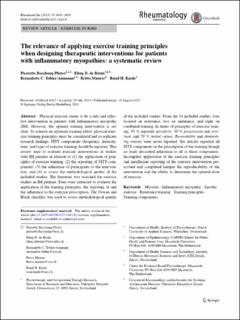Please use this identifier to cite or link to this item:
https://doi.org/10.21256/zhaw-22711Full metadata record
| DC Field | Value | Language |
|---|---|---|
| dc.contributor.author | Baschung Pfister, Pierrette | - |
| dc.contributor.author | de Bruin, Eling D. | - |
| dc.contributor.author | Tobler-Ammann, Bernadette C. | - |
| dc.contributor.author | Maurer, Britta | - |
| dc.contributor.author | Knols, Ruud H. | - |
| dc.date.accessioned | 2021-06-23T12:07:12Z | - |
| dc.date.available | 2021-06-23T12:07:12Z | - |
| dc.date.issued | 2015 | - |
| dc.identifier.issn | 0172-8172 | de_CH |
| dc.identifier.issn | 1437-160X | de_CH |
| dc.identifier.uri | https://digitalcollection.zhaw.ch/handle/11475/22711 | - |
| dc.description | Erworben im Rahmen der Schweizer Nationallizenzen (http://www.nationallizenzen.ch) | de_CH |
| dc.description.abstract | Physical exercise seems to be a safe and effective intervention in patients with inflammatory myopathy (IM). However, the optimal training intervention is not clear. To achieve an optimum training effect, physical exercise training principles must be considered and to replicate research findings, FITT components (frequency, intensity, time, and type) of exercise training should be reported. This review aims to evaluate exercise interventions in studies with IM patients in relation to (1) the application of principles of exercise training, (2) the reporting of FITT components, (3) the adherence of participants to the intervention, and (4) to assess the methodological quality of the included studies. The literature was searched for exercise studies in IM patients. Data were extracted to evaluate the application of the training principles, the reporting of and the adherence to the exercise prescription. The Downs and Black checklist was used to assess methodological quality of the included studies. From the 14 included studies, four focused on resistance, two on endurance, and eight on combined training. In terms of principles of exercise training, 93 % reported specificity, 50 % progression and overload, and 79 % initial values. Reversibility and diminishing returns were never reported. Six articles reported all FITT components in the prescription of the training though no study described adherence to all of these components. Incomplete application of the exercise training principles and insufficient reporting of the exercise intervention prescribed and completed hamper the reproducibility of the intervention and the ability to determine the optimal dose of exercise. | de_CH |
| dc.language.iso | en | de_CH |
| dc.publisher | Springer | de_CH |
| dc.relation.ispartof | Rheumatology International | de_CH |
| dc.rights | Licence according to publishing contract | de_CH |
| dc.subject | Aerobic exercise | de_CH |
| dc.subject | Inflammatory myopathy | de_CH |
| dc.subject | Myositis | de_CH |
| dc.subject | Resistance training | de_CH |
| dc.subject | Training component | de_CH |
| dc.subject | Training principle | de_CH |
| dc.subject | Human | de_CH |
| dc.subject | Myositis | de_CH |
| dc.subject | Quality of life | de_CH |
| dc.subject | Reproducibility of results | de_CH |
| dc.subject | Exercise | de_CH |
| dc.subject | Exercise therapy | de_CH |
| dc.subject.ddc | 615.82: Physiotherapie | de_CH |
| dc.subject.ddc | 616.7: Krankheiten des Bewegungsapparates und Orthopädie | de_CH |
| dc.title | The relevance of applying exercise training principles when designing therapeutic interventions for patients with inflammatory myopathies : a systematic review | de_CH |
| dc.type | Beitrag in wissenschaftlicher Zeitschrift | de_CH |
| dcterms.type | Text | de_CH |
| zhaw.departement | Gesundheit | de_CH |
| zhaw.organisationalunit | Institut für Physiotherapie (IPT) | de_CH |
| dc.identifier.doi | 10.1007/s00296-015-3343-9 | de_CH |
| dc.identifier.doi | 10.21256/zhaw-22711 | - |
| dc.identifier.pmid | 26271469 | de_CH |
| zhaw.funding.eu | No | de_CH |
| zhaw.issue | 10 | de_CH |
| zhaw.originated.zhaw | Yes | de_CH |
| zhaw.pages.end | 1654 | de_CH |
| zhaw.pages.start | 1641 | de_CH |
| zhaw.publication.status | publishedVersion | de_CH |
| zhaw.volume | 35 | de_CH |
| zhaw.publication.review | Peer review (Publikation) | de_CH |
| zhaw.author.additional | No | de_CH |
| zhaw.display.portrait | Yes | de_CH |
| Appears in collections: | Publikationen Gesundheit | |
Files in This Item:
| File | Description | Size | Format | |
|---|---|---|---|---|
| 2015_Baschung-Pfister-etal_Exercise-training-principles-therapeutic-interventions.pdf | 1.09 MB | Adobe PDF |  View/Open |
Show simple item record
Baschung Pfister, P., de Bruin, E. D., Tobler-Ammann, B. C., Maurer, B., & Knols, R. H. (2015). The relevance of applying exercise training principles when designing therapeutic interventions for patients with inflammatory myopathies : a systematic review. Rheumatology International, 35(10), 1641–1654. https://doi.org/10.1007/s00296-015-3343-9
Baschung Pfister, P. et al. (2015) ‘The relevance of applying exercise training principles when designing therapeutic interventions for patients with inflammatory myopathies : a systematic review’, Rheumatology International, 35(10), pp. 1641–1654. Available at: https://doi.org/10.1007/s00296-015-3343-9.
P. Baschung Pfister, E. D. de Bruin, B. C. Tobler-Ammann, B. Maurer, and R. H. Knols, “The relevance of applying exercise training principles when designing therapeutic interventions for patients with inflammatory myopathies : a systematic review,” Rheumatology International, vol. 35, no. 10, pp. 1641–1654, 2015, doi: 10.1007/s00296-015-3343-9.
BASCHUNG PFISTER, Pierrette, Eling D. DE BRUIN, Bernadette C. TOBLER-AMMANN, Britta MAURER und Ruud H. KNOLS, 2015. The relevance of applying exercise training principles when designing therapeutic interventions for patients with inflammatory myopathies : a systematic review. Rheumatology International. 2015. Bd. 35, Nr. 10, S. 1641–1654. DOI 10.1007/s00296-015-3343-9
Baschung Pfister, Pierrette, Eling D. de Bruin, Bernadette C. Tobler-Ammann, Britta Maurer, and Ruud H. Knols. 2015. “The Relevance of Applying Exercise Training Principles When Designing Therapeutic Interventions for Patients with Inflammatory Myopathies : A Systematic Review.” Rheumatology International 35 (10): 1641–54. https://doi.org/10.1007/s00296-015-3343-9.
Baschung Pfister, Pierrette, et al. “The Relevance of Applying Exercise Training Principles When Designing Therapeutic Interventions for Patients with Inflammatory Myopathies : A Systematic Review.” Rheumatology International, vol. 35, no. 10, 2015, pp. 1641–54, https://doi.org/10.1007/s00296-015-3343-9.
Items in DSpace are protected by copyright, with all rights reserved, unless otherwise indicated.